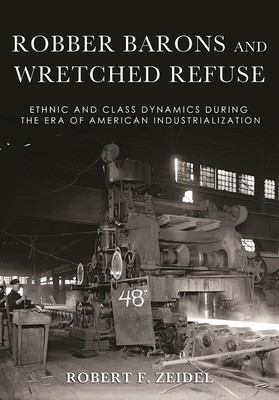
- We will send in 10–14 business days.
- Author: Robert F Zeidel
- Publisher: Northern Illinois University Press
- ISBN-10: 1501748319
- ISBN-13: 9781501748318
- Format: 15.2 x 22.9 x 2.1 cm, hardcover
- Language: English
- SAVE -10% with code: EXTRA
Reviews
Description
Robber Barons and Wretched Refuse explores the connection between the so-called robber barons who led American big businesses during the Gilded Age and Progressive Era and the immigrants who composed many of their workforces. As Robert F. Zeidel argues, attribution of industrial-era class conflict to an "alien" presence supplements nativism--a sociocultural negativity toward foreign-born residents--as a reason for Americans' dislike and distrust of immigrants. And in the era of American industrialization, employers both relied on immigrants to meet their growing labor needs and blamed them for the frequently violent workplace contentions of the time. Through a sweeping narrative, Zeidel uncovers the connection of immigrants to radical "isms" that gave rise to widespread notions of alien subversives whose presence threatened America's domestic tranquility and the well-being of its residents. Employers, rather than looking at their own practices for causes of workplace conflict, wontedly attributed strikes and other unrest to aliens who either spread pernicious "foreign" doctrines or fell victim to their siren messages. These characterizations transcended nationality or ethnic group, applying at different times to all foreign-born workers.
Zeidel concludes that, ironically, stigmatizing immigrants as subversives contributed to the passage of the Quota Acts, which effectively stemmed the flow of wanted foreign workers. Post-war employers argued for preserving America's traditional open door, but the negativity that they had assigned to foreign workers contributed to its closing.
EXTRA 10 % discount with code: EXTRA
The promotion ends in 20d.16:55:02
The discount code is valid when purchasing from 10 €. Discounts do not stack.
- Author: Robert F Zeidel
- Publisher: Northern Illinois University Press
- ISBN-10: 1501748319
- ISBN-13: 9781501748318
- Format: 15.2 x 22.9 x 2.1 cm, hardcover
- Language: English English
Robber Barons and Wretched Refuse explores the connection between the so-called robber barons who led American big businesses during the Gilded Age and Progressive Era and the immigrants who composed many of their workforces. As Robert F. Zeidel argues, attribution of industrial-era class conflict to an "alien" presence supplements nativism--a sociocultural negativity toward foreign-born residents--as a reason for Americans' dislike and distrust of immigrants. And in the era of American industrialization, employers both relied on immigrants to meet their growing labor needs and blamed them for the frequently violent workplace contentions of the time. Through a sweeping narrative, Zeidel uncovers the connection of immigrants to radical "isms" that gave rise to widespread notions of alien subversives whose presence threatened America's domestic tranquility and the well-being of its residents. Employers, rather than looking at their own practices for causes of workplace conflict, wontedly attributed strikes and other unrest to aliens who either spread pernicious "foreign" doctrines or fell victim to their siren messages. These characterizations transcended nationality or ethnic group, applying at different times to all foreign-born workers.
Zeidel concludes that, ironically, stigmatizing immigrants as subversives contributed to the passage of the Quota Acts, which effectively stemmed the flow of wanted foreign workers. Post-war employers argued for preserving America's traditional open door, but the negativity that they had assigned to foreign workers contributed to its closing.


Reviews